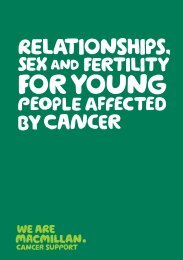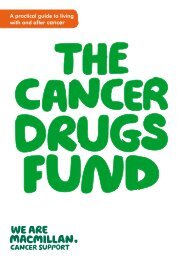Understanding chemotherapy - Macmillan Cancer
Understanding chemotherapy - Macmillan Cancer
Understanding chemotherapy - Macmillan Cancer
You also want an ePaper? Increase the reach of your titles
YUMPU automatically turns print PDFs into web optimized ePapers that Google loves.
<strong>Understanding</strong> <strong>chemotherapy</strong>DiarrhoeaSome <strong>chemotherapy</strong> drugs can cause diarrhoea, usually in thefirst few days. Let your nurse or doctor know if this happens asthey can prescribe medicine to reduce this.Make sure you drink plenty of liquid (up to two litres a day)to replace fluid you’re losing with diarrhoea. Eat less fibre(cereals, raw vegetables and fruits) until the diarrhoea improves.Sometimes diarrhoea can be more severe, and it’s importantto contact the hospital if this happens. If you have more than4–6 episodes of diarrhoea a day, contact the hospital on thetelephone numbers you’ve been given and speak to a doctoror nurse.ConstipationSome <strong>chemotherapy</strong> drugs and also anti-sickness drugs andpainkillers can cause constipation. Let your nurse or doctorknow if this happens so they can prescribe drugs to prevent ortreat it.Try to eat more fibre (cereals, raw vegetables and fruits)and drink plenty of liquid. Gentle exercise, such as short walks,can help to improve constipation.Loss of appetiteChemotherapy can affect your appetite. If you have apoor appetite try to eat little amounts as often as possible.Keep snacks, such as nuts, grated cheese or dried fruit,handy to eat whenever you can.It’s important to try to eat well during your treatment. If you’rehaving problems ask your nurse for advice and you can alsoask to see a dietitian.54
















